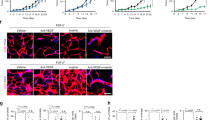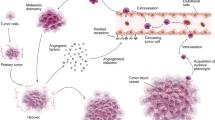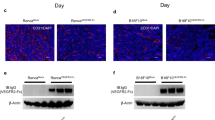Abstract
Endoglin, a transforming growth factor-β co-receptor, is highly expressed on angiogenic endothelial cells in solid tumors. Therefore, targeting endoglin is currently being explored in clinical trials for anti-angiogenic therapy. In this project, the redundancy between endoglin and vascular endothelial growth factor (VEGF) signaling in angiogenesis and the effects of targeting both pathways on breast cancer metastasis were explored. In patient samples, increased endoglin signaling after VEGF inhibition was observed. In vitro TRC105, an endoglin-neutralizing antibody, increased VEGF signaling in endothelial cells. Moreover, combined targeting of the endoglin and VEGF pathway, with the VEGF receptor kinase inhibitor SU5416, increased antiangiogenic effects in vitro and in a zebrafish angiogenesis model. Next, in a mouse model for invasive lobular breast cancer, the effects of TRC105 and SU5416 on tumor growth and metastasis were explored. Although TRC105 and SU5416 decreased tumor vascular density, tumor volume was unaffected. Strikingly, in mice treated with TRC105, or TRC105 and SU5416 combined, a strong inhibition in the number of metastases was seen. Moreover, upon resection of the primary tumor, strong inhibition of metastatic spread by TRC105 was observed in an adjuvant setting. To confirm these data, we assessed the effects of endoglin-Fc (an endoglin ligand trap) on metastasis formation. Similar to treatment with TRC105 in the resection model, endoglin-Fc-expressing tumors showed strong inhibition of distant metastases. These results show, for the first time, that targeting endoglin, either with neutralizing antibodies or a ligand trap, strongly inhibits metastatic spread of breast cancer in vivo.
This is a preview of subscription content, access via your institution
Access options
Subscribe to this journal
Receive 50 print issues and online access
$259.00 per year
only $5.18 per issue
Buy this article
- Purchase on Springer Link
- Instant access to full article PDF
Prices may be subject to local taxes which are calculated during checkout







Similar content being viewed by others
References
Torre LA, Bray F, Siegel RL, Ferlay J, Lortet-Tieulent J, Jemal A . Global cancer statistics, 2012. CA Cancer J Clin 2015; 65: 87–108.
Folkman J, Cole P, Zimmerman S . Tumor behavior in isolated perfused organs: in vitro growth and metastases of biopsy material in rabbit thyroid and canine intestinal segment. Ann Surg 1966; 164: 491–502.
Carmeliet P, Jain RK . Angiogenesis in cancer and other diseases. Nature 2000; 407: 249–257.
Folkman J, Merler E, Abernathy C, Williams G . Isolation of a tumor factor responsible for angiogenesis. J Exp Med 1971; 133: 275–288.
Sitohy B, Nagy JA, Dvorak HF . Anti-VEGF/VEGFR therapy for cancer: reassessing the target. Cancer Res 2012; 72: 1909–1914.
Sounni NE, Cimino J, Blacher S, Primac I, Truong A, Mazzucchelli G et al. Blocking lipid synthesis overcomes tumor regrowth and metastasis after antiangiogenic therapy withdrawal. Cell Metab 2014; 20: 280–294.
Bergers G, Hanahan D . Modes of resistance to anti-angiogenic therapy. Nat Rev Cancer 2008; 8: 592–603.
Burrows FJ, Derbyshire EJ, Tazzari PL, Amlot P, Gazdar AF, King SW et al. Up-regulation of endoglin on vascular endothelial cells in human solid tumors: implications for diagnosis and therapy. Clin Cancer Res 1995; 1: 1623–1634.
Miller DW, Graulich W, Karges B, Stahl S, Ernst M, Ramaswamy A et al. Elevated expression of endoglin, a component of the TGF-beta-receptor complex, correlates with proliferation of tumor endothelial cells. Int J Cancer 1999; 81: 568–572.
Fonsatti E, Jekunen AP, Kairemo KJ, Coral S, Snellman M, Nicotra MR et al. Endoglin is a suitable target for efficient imaging of solid tumors: in vivo evidence in a canine mammary carcinoma model. Clin Cancer Res 2000; 6: 2037–2043.
Li DY, Sorensen LK, Brooke BS, Urness LD, Davis EC, Taylor DG et al. Defective angiogenesis in mice lacking endoglin. Science 1999; 284: 1534–1537.
Arthur HM, Ure J, Smith AJ, Renforth G, Wilson DI, Torsney E et al. Endoglin, an ancillary TGFbeta receptor, is required for extraembryonic angiogenesis and plays a key role in heart development. Dev Biol 2000; 217: 42–53.
Bourdeau A, Dumont DJ, Letarte M . A murine model of hereditary hemorrhagic telangiectasia. J Clin Invest 1999; 104: 1343–1351.
Taranger-Charpin C, Dales JP, Garcia S, Andrac-Meyer L, Ramuz O, Carpentier-Meunier S et al. The immunohistochemical expression of CD105 is a marker for high metastatic risk and worse prognosis in breast cancers. Bull Acad Natl Med 2003; 187: 1129–1145.
Zijlmans HJ, Fleuren GJ, Hazelbag S, Sier CF, Dreef EJ, Kenter GG et al. Expression of endoglin (CD105) in cervical cancer. Br J Cancer 2009; 100: 1617–1626.
Seon BK, Haba A, Matsuno F, Takahashi N, Tsujie M, She X et al. Endoglin-targeted cancer therapy. Curr Drug Deliv 2011; 8: 135–143.
Paauwe M, ten Dijke P, Hawinkels LJ . Endoglin for tumor imaging and targeted cancer therapy. Expert Opin Ther Targets 2013; 17: 421–435.
Perez-Gomez E, Del CG, Juan FS, Lopez-Novoa JM, Bernabeu C, Quintanilla M . The role of the TGF-beta coreceptor endoglin in cancer. ScientificWorldJournal 2010; 10: 2367–2384.
Rosen LS, Hurwitz HI, Wong MK, Goldman J, Mendelson DS, Figg WD et al. A phase I first-in-human study of TRC105 (anti-endoglin antibody) in patients with advanced cancer. Clin Cancer Res 2012; 18: 4820–4829.
Nolan-Stevaux O, Zhong W, Culp S, Shaffer K, Hoover J, Wickramasinghe D et al. Endoglin requirement for BMP9 signaling in endothelial cells reveals new mechanism of action for selective anti-endoglin antibodies. PLoS One 2012; 7: e50920.
Gordon MS, Robert F, Matei D, Mendelson DS, Goldman JW, Chiorean EG et al. An open-label phase Ib dose-escalation study of TRC105 (anti-endoglin antibody) with bevacizumab in patients with advanced cancer. Clin Cancer Res 2014; 20: 5918–5926.
Derksen PW, Liu X, Saridin F, van der Gulden H, Zevenhoven J, Evers B et al. Somatic inactivation of E-cadherin and p53 in mice leads to metastatic lobular mammary carcinoma through induction of anoikis resistance and angiogenesis. Cancer Cell 2006; 10: 437–449.
Liu Y, Tian H, Blobe GC, Theuer CP, Hurwitz HI, Nixon AB . Effects of the combination of TRC105 and bevacizumab on endothelial cell biology. Invest New Drugs 2014; 32: 851–859.
Pan CC, Kumar S, Shah N, Hoyt DG, Hawinkels LJ, Mythreye K et al. Src-mediated post-translational regulation of endoglin stability and function is critical for angiogenesis. J Biol Chem 2014; 289: 25486–25496.
Tsujie M, Tsujie T, Toi H, Uneda S, Shiozaki K, Tsai H et al. Anti-tumor activity of an anti-endoglin monoclonal antibody is enhanced in immunocompetent mice. Int J Cancer 2008; 122: 2266–2273.
Liu Y, Starr MD, Brady JC, Dellinger A, Pang H, Adams B et al. Modulation of circulating protein biomarkers following TRC105 (anti-endoglin antibody) treatment in patients with advanced cancer. Cancer Med 2014; 3: 580–591.
Jain RK . Antiangiogenesis strategies revisited: from starving tumors to alleviating hypoxia. Cancer Cell 2014; 26: 605–622.
Arjaans M, Oude Munnink TH, Oosting SF, Terwisscha van Scheltinga AG, Gietema JA, Garbacik ET et al. Bevacizumab-induced normalization of blood vessels in tumors hampers antibody uptake. Cancer Res 2013; 73: 3347–3355.
Goel S, Duda DG, Xu L, Munn LL, Boucher Y, Fukumura D et al. Normalization of the vasculature for treatment of cancer and other diseases. Physiol Rev 2011; 91: 1071–1121.
Hawinkels LJ, de Vinuesa AG, Paauwe M, Kruithof-de JM, Wiercinska E, Pardali E et al. Activin receptor-like kinase 1 ligand trap reduces microvascular density and improves chemotherapy efficiency to various solid tumors. Clin Cancer Res 2015, e-pub ahead of print 15 September 2015.
Karzai FH, Apolo AB, Cao L, Madan RA, Adelberg DE, Parnes H et al. A phase I study of TRC105 anti-CD105 (endoglin) antibody in metastatic castration-resistant prostate cancer. BJU Int 2014; 116: 546–555.
Anderberg C, Cunha SI, Zhai Z, Cortez E, Pardali E, Johnson JR et al. Deficiency for endoglin in tumor vasculature weakens the endothelial barrier to metastatic dissemination. J Exp Med 2013; 210: 563–579.
McAllister KA, Grogg KM, Johnson DW, Gallione CJ, Baldwin MA, Jackson CE et al. Endoglin, a TGF-beta binding protein of endothelial cells, is the gene for hereditary haemorrhagic telangiectasia type 1. Nat Genet 1994; 8: 345–351.
Jerkic M, Letarte M . Increased endothelial cell permeability in endoglin-deficient cells. FASEB J 2015; 29: 3678–3688.
Romero D, O'Neill C, Terzic A, Contois L, Young K, Conley BA et al. Endoglin regulates cancer-stromal cell interactions in prostate tumors. Cancer Res 2011; 71: 3482–3493.
Henry LA, Johnson DA, Sarrio D, Lee S, Quinlan PR, Crook T et al. Endoglin expression in breast tumor cells suppresses invasion and metastasis and correlates with improved clinical outcome. Oncogene 2011; 30: 1046–1058.
Lastres P, Bellon T, Cabanas C, Sanchez-Madrid F, Acevedo A, Gougos A et al. Regulated expression on human macrophages of endoglin, an Arg-Gly-Asp-containing surface antigen. Eur J Immunol 1992; 22: 393–397.
Aristorena M, Blanco FJ, de Las Casas-Engel M, Ojeda-Fernandez L, Gallardo-Vara E, Corbi A et al. Expression of endoglin isoforms in the myeloid lineage and their role during aging and macrophage polarization. J Cell Sci 2014; 127: 2723–2735.
de Kruijf EM, Dekker TJ, Hawinkels LJ, Putter H, Smit VT, Kroep JR et al. The prognostic role of TGF-beta signaling pathway in breast cancer patients. Ann Oncol 2012; 24: 384–390.
Dekker TJ, van de Velde CJ, van Pelt GW, Kroep JR, Julien JP, Smit VT et al. Prognostic significance of the tumor-stroma ratio: validation study in node-negative premenopausal breast cancer patients from the EORTC perioperative chemotherapy (POP) trial (10854). Breast Cancer Res Treat 2013; 139: 371–379.
Khamis ZI, Sahab ZJ, Sang QX . Active roles of tumor stroma in breast cancer metastasis. Int J Breast Cancer 2012; 2012: 574025.
Hawinkels LJ, Verspaget HW, van Duijn W, van der Zon JM, Zuidwijk K, Kubben FJ et al. Tissue level, activation and cellular localisation of TGF-beta1 and association with survival in gastric cancer patients. Br J Cancer 2007; 97: 398–404.
Van Baardewijk LJ, Van der Ende J, Lissenberg-Thunnissen S, Romijn LM, Hawinkels LJ, Sier CF et al. Circulating bone morphogenetic protein levels and delayed fracture healing. Int Orthop 2013; 37: 523–527.
Hawinkels LJ, Paauwe M, Verspaget HW, Wiercinska E, van der Zon JM, van der Ploeg K et al. Interaction with colon cancer cells hyperactivates TGF-beta signaling in cancer-associated fibroblasts. Oncogene 2014; 33: 97–107.
Hawinkels LJ, Kuiper P, Wiercinska E, Verspaget HW, Liu Z, Pardali E et al. Matrix metalloproteinase-14 (MT1-MMP)-mediated endoglin shedding inhibits tumor angiogenesis. Cancer Res 2010; 70: 4141–4150.
Persson U, Izumi H, Souchelnytskyi S, Itoh S, Grimsby S, Engstrom U et al. The L45 loop in type I receptors for TGF-beta family members is a critical determinant in specifying Smad isoform activation. FEBS Lett 1998; 434: 83–87.
Hawinkels LJ, Zuidwijk K, Verspaget HW, de Jonge-Muller ES, van Duijn W, Ferreira V et al. VEGF release by MMP-9 mediated heparan sulphate cleavage induces colorectal cancer angiogenesis. Eur J Cancer 2008; 44: 1904–1913.
Buijs JT, Matula KM, Cheung H, Kruithof-de Julio M, van der Mark MH, Snoeks TJ et al. Spontaneous bone metastases in a preclinical orthotopic model of invasive lobular carcinoma; the effect of pharmacological targeting TGFbeta receptor I kinase. J Pathol 2015; 235: 745–759.
Acknowledgements
We thank Jos Jonkers (Netherlands Cancer Institute, Amsterdam) for providing the KEP1-11 mouse breast cancer cells, Midory Thorikay for generating Fc and endoglin-Fc lentiviral expression constructs, Henry Cheung and Gabri van der Pluijm for practical help in establishing the in vivo model and Peter ten Dijke, Hans van Dam and Marie-Jose Goumans (Leiden University Medical Center) for valuable discussions. This work was supported by the Alpe d’huZes/Bas Mulder award 2011 (UL2011-5051) to LJACH and MP and by a sponsored research grant from Tracon Pharmaceuticals.
Author information
Authors and Affiliations
Corresponding author
Ethics declarations
Competing interests
CP Theuer is a full-time employee of Tracon Pharmaceuticals. All other authors declare no conflict of interest.
Additional information
Supplementary Information accompanies this paper on the Oncogene website
Supplementary information
Rights and permissions
About this article
Cite this article
Paauwe, M., Heijkants, R., Oudt, C. et al. Endoglin targeting inhibits tumor angiogenesis and metastatic spread in breast cancer. Oncogene 35, 4069–4079 (2016). https://doi.org/10.1038/onc.2015.509
Received:
Revised:
Accepted:
Published:
Issue Date:
DOI: https://doi.org/10.1038/onc.2015.509
This article is cited by
-
Glioblastoma CD105+ cells define a SOX2− cancer stem cell-like subpopulation in the pre-invasive niche
Acta Neuropathologica Communications (2022)
-
Colorectal liver metastasis: molecular mechanism and interventional therapy
Signal Transduction and Targeted Therapy (2022)
-
Endoglin (CD105) and VEGF as potential angiogenic and dissemination markers for colorectal cancer
World Journal of Surgical Oncology (2020)
-
Continuous endoglin (CD105) overexpression disrupts angiogenesis and facilitates tumor cell metastasis
Angiogenesis (2020)
-
Effects of Chlorella vulgaris on tumor growth in mammary tumor-bearing Balb/c mice: discussing association of an immune-suppressed protumor microenvironment with serum IFNγ and IgG decrease and spleen IgG potentiation
European Journal of Nutrition (2018)



